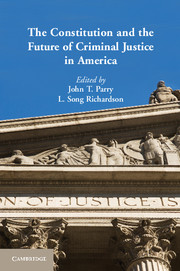Book contents
- Frontmatter
- Contents
- Contributors
- Acknowledgments
- Introduction
- Part I Foundations – The Scope of Criminal Law and Access to Counsel
- Part II Race and Criminal Procedure
- Part III Policing and Privacy
- Part IV Technology and the Surveillance Society
- Part V Confessions and miranda
- Part VI Conviction, Sentencing, and Incarceration
- 12 Collateral Consequences of Criminal Conviction
- 13 Psychopathy, Criminal Responsibility, Punishment, and the Eighth Amendment
- Part VII Emergencies and Borders – Immigration, Terrorism, National Security, and Transnational Crime
- Index
- References
13 - Psychopathy, Criminal Responsibility, Punishment, and the Eighth Amendment
Published online by Cambridge University Press: 05 June 2014
- Frontmatter
- Contents
- Contributors
- Acknowledgments
- Introduction
- Part I Foundations – The Scope of Criminal Law and Access to Counsel
- Part II Race and Criminal Procedure
- Part III Policing and Privacy
- Part IV Technology and the Surveillance Society
- Part V Confessions and miranda
- Part VI Conviction, Sentencing, and Incarceration
- 12 Collateral Consequences of Criminal Conviction
- 13 Psychopathy, Criminal Responsibility, Punishment, and the Eighth Amendment
- Part VII Emergencies and Borders – Immigration, Terrorism, National Security, and Transnational Crime
- Index
- References
Summary
Introduction
Criminal responsibility is a complex subject, and in a retributive system such as that in the United States, it rests on presuppositions about the cognitive capacities of individuals whom we intend to punish. Under the Eighth Amendment, which prohibits “cruel and unusual punishment,” considerations of proportionality limit the extent to which a criminal offender may be punished for a particular crime. In some cases, a defendant’s “subrationality” or “cognitive incapacities” may serve to mitigate or fully excuse criminal responsibility, but standards tend to be very high when it comes to criminal excuses. The M’Naghten standard for legal insanity, for example, requires that a defendant, at the time of his act, not know the nature and quality of said act or know that it was wrong. In practice, this standard will often only be met by individuals suffering from such a profound mental disturbance (such as a psychotic/thought disorder) that most observers would be compelled to declare the defendant resolutely “insane.”
Recently, however, the United States Supreme Court has made a number of rulings aimed at staking out the boundaries of mitigation of responsibility, based upon empirical research on human cognition and psychological development. Defendants who were previously held fully responsible for severe offenses are now held to a reduced standard of responsibility, and certain penalties that were formerly considered acceptable are now prohibited for some classes of criminal offenders. The scope of these rulings has thus far been limited to cases where public sentiment weighed in favor of mitigation, such as in cases of juveniles and individuals with severe mental handicaps. In this chapter, we will explore whether psychopathy, a condition that is considerably less likely to attract public sympathy, may nonetheless be appropriately treated as a mitigating condition given modern research in psychology and neuroscience. We close with a discussion of what this may mean for future developments in Eighth Amendment law.
- Type
- Chapter
- Information
- The Constitution and the Future of Criminal Justice in America , pp. 222 - 238Publisher: Cambridge University PressPrint publication year: 2013



